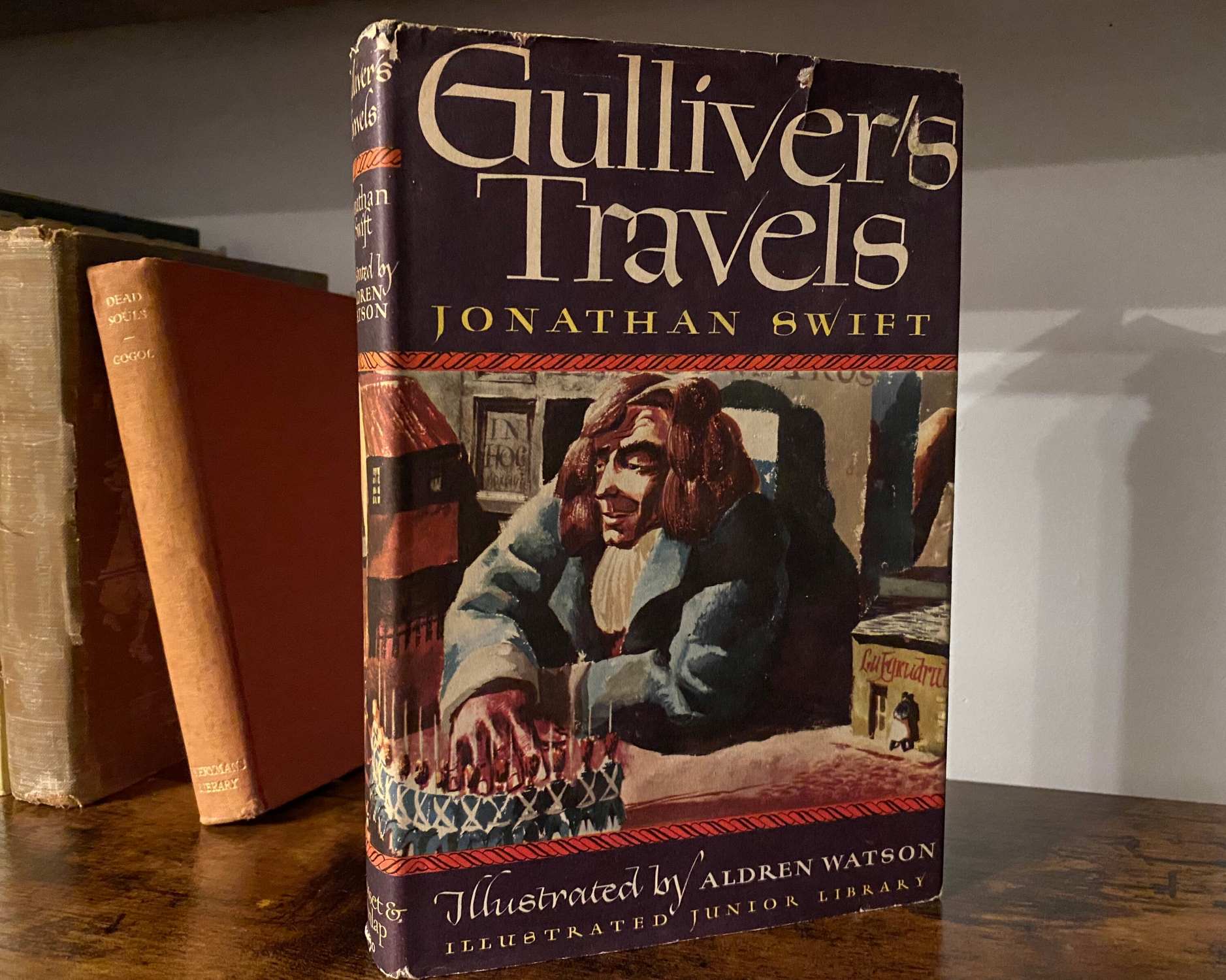
Gulliver’s Travels, written by Jonathan Swift, is a literary masterpiece that has captivated readers for centuries. This satirical novel takes readers on an extraordinary journey with Lemuel Gulliver, a ship’s surgeon who finds himself stranded in various bizarre and fantastical lands inhabited by creatures of all sizes. Swift’s witty and insightful commentary on human nature, politics, and society makes this novel a timeless piece of literature. In this article, we will delve into 20 mind-blowing facts about Gulliver’s Travels that will enhance your understanding and appreciation of this iconic work. So, buckle up and get ready to embark on a literary adventure filled with extraordinary characters, clever social commentary, and thought-provoking themes.
Key Takeaways:
- Gulliver’s Travels, written by Jonathan Swift, is a timeless classic that uses satire to critique society, explore themes of identity, and challenge the idea of civilization.
- The novel’s enduring popularity has led to numerous adaptations and translations, making it accessible to a global audience and ensuring its relevance in modern times.
Gulliver’s Travels was first published in 1726.
Written by Jonathan Swift, this satirical novel has stood the test of time and continues to captivate readers with its imaginative storytelling.
The novel is divided into four parts.
Gulliver’s Travels is structured as a series of four voyages that take the protagonist, Lemuel Gulliver, to strange and fantastical lands.
The miniature inhabitants of Lilliput became an iconic feature of the story.
Gulliver’s encounter with the tiny people of Lilliput, who are approximately six inches tall, has become one of the most recognizable aspects of the novel.
The character of Gulliver is often seen as an allegorical representation of British society.
As Gulliver encounters various civilizations in his travels, Swift uses these encounters to comment on the political, social, and cultural climate of 18th-century England.
Gulliver’s Travels is considered a classic of English literature.
The novel’s enduring popularity and its influence on subsequent works of fiction have solidified its place as a literary masterpiece.
The novel has been adapted into numerous film and television versions.
From animated adaptations to live-action films, Gulliver’s Travels has inspired a variety of visual interpretations over the years.
Jonathan Swift wrote Gulliver’s Travels as a travelogue.
Although the story is a work of fiction, Swift wrote it in the style of a travel diary, adding an element of realism to the fantastical events Gulliver encounters.
The portrayal of Brobdingnag, a land of giants, fascinated readers.
In this part of the story, Gulliver finds himself among inhabitants who are 60 feet tall, offering a stark contrast to the miniature Lilliputians.
The novel contains numerous satirical elements.
Swift uses satire to critique various aspects of society, including politics, human nature, and irrationality.
Gulliver’s Travels has been translated into multiple languages.
The enduring popularity of the novel has led to translations in languages around the world, making it accessible to a global audience.
The novel explores themes of identity and self-discovery.
Through Gulliver’s encounters with different civilizations, the story delves into questions of individuality, cultural relativism, and what it means to truly understand oneself.
Swift originally published Gulliver’s Travels under a pseudonym.
The novel was first attributed to a fictitious author named Lemuel Gulliver, adding an extra layer of intrigue to its initial release.
Parts of Gulliver’s Travels are still studied in schools and universities today.
The novel’s rich symbolism and social commentary make it a frequent choice for academic study and analysis.
The character of Gulliver has inspired other works of literature.
Gulliver’s Travels has influenced subsequent authors who have created their own versions of a protagonist embarking on extraordinary voyages.
The novel satirizes human flaws and vices.
Through exaggeration and irony, Swift exposes the follies of society and highlights the destructive tendencies of human nature.
Gulliver’s Travels explores the theme of power and its corrupting influence.
Gulliver’s encounters with different societies serve as a critique of authoritarianism, imperialism, and the abuse of power.
The novel challenges the idea of civilization and what it means to be civilized.
Swift raises questions about the true nature of civilization and highlights the absurdity of certain societal norms and practices.
Gulliver’s Travels has been adapted into stage plays and musicals.
The enduring appeal of the story has led to theatrical adaptations that bring the adventures of Gulliver to life on stage.
Jonathan Swift’s writing reflects his wit and clever wordplay.
Swift’s use of satire and his ability to create memorable characters and situations demonstrate his mastery of the written word.
Gulliver’s Travels continues to be relevant in modern times.
The novel’s themes and critiques of society still resonate today, making it a work of fiction that withstands the test of time.
So there you have it, 20 mind-blowing facts about Gulliver’s Travels – Jonathan Swift. Whether you are a fan of the novel or discovering it for the first time, these facts highlight the enduring legacy and impact of Swift’s masterpiece. From its exploration of societal norms to its imaginative storytelling, Gulliver’s Travels remains a captivating and thought-provoking work of literature.
Conclusion
In conclusion, Gulliver’s Travels by Jonathan Swift is a literary masterpiece that continues to captivate readers with its satirical and thought-provoking content. Through the fantastical adventures of Lemuel Gulliver, Swift offers a scathing critique of human nature, societal norms, and political systems.The novel’s enduring popularity can be attributed to its complexity and ability to resonate with readers across generations. Swift’s sharp wit and clever use of satire shed light on the flaws and follies of society, prompting us to question our own behavior and the world around us.Gulliver’s Travels is a timeless classic that not only entertains but also challenges our assumptions and encourages us to strive for a more enlightened and compassionate society. Its impact on literature and popular culture cannot be overstated, solidifying its status as one of the greatest works of fiction ever written.
FAQs
1. Is Gulliver’s Travels a true story?
No, Gulliver’s Travels is a work of fiction by Jonathan Swift. While it is presented as a travelogue, the adventures of Lemuel Gulliver in different lands are imaginary and used to satirize various aspects of society.
2. What is the main theme of Gulliver’s Travels?
The main theme of Gulliver’s Travels is the exploration of human nature and society’s flaws. Swift uses Gulliver’s encounters with different societies to critique political systems, religious institutions, and human behavior, ultimately suggesting that humanity is flawed and in need of reform.
3. When was Gulliver’s Travels first published?
Gulliver’s Travels was first published in 1726.
4. Why is Gulliver’s Travels considered a classic?
Gulliver’s Travels is considered a classic because of its timeless themes, engaging storytelling, and its ability to provoke critical thinking and self-reflection. It remains relevant today due to its social commentary and satirical portrayal of human nature.
5. Has Gulliver’s Travels been adapted into other forms of media?
Yes, Gulliver’s Travels has been adapted into various forms of media, including films, television shows, and stage plays. These adaptations have helped to introduce Swift’s story to new audiences and further cement its place in popular culture.
If you're a fan of witty satiresatire, thrilling
Was this page helpful?
Our commitment to delivering trustworthy and engaging content is at the heart of what we do. Each fact on our site is contributed by real users like you, bringing a wealth of diverse insights and information. To ensure the highest standards of accuracy and reliability, our dedicated editors meticulously review each submission. This process guarantees that the facts we share are not only fascinating but also credible. Trust in our commitment to quality and authenticity as you explore and learn with us.


